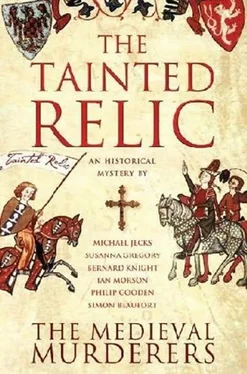Robert Blundus had been making his way back through Aquitaine and Anjou to reach the Channel ports to return home after his autumn forage for relics as far south as Santiago de Compostela in Spain. He had called at Fontrevault on the off-chance of picking up a final bargain, perhaps from one of the other relic hawkers trying their luck at selling to the famous abbey. He followed his usual practice of seeking out and bribing some servant of the religious house who knew all the local gossip, and this time struck lucky with the abbey clerk. On the basis of what he learnt from him, Blundus hired a thug from a low tavern to steal the fragment, the side chapel being virtually deserted at certain times of the day. The thief easily levered open the reliquary with his dagger and removed the gilded box. It could well be days or even weeks before anyone noticed that the shunned relic had vanished-and according to the clerk, the abbey authorities might well be relieved at its disappearance.
Without opening the box, the incurious thief had promptly handed it over to collect his reward, and by nightfall Blundus was well on his way north astride his pony. He kept a wary eye open for pursuit, in case the ruffian had given him away, but he reached St-Malo without incident and here sold his steed and took ship for England.
Now he settled back on his bag of straw and contentedly looked forward to going home to his house and his wife in Salisbury. Once he had sold the relics he had acquired, he could live in comfort on the proceeds throughout the winter, until the spring sent him off again on his travels.
Blundus set out soon after dawn, buying a couple of mutton pastries and a small loaf at a stall in Topsham High Street. He ate as he trudged along, well used to long journeys on foot-he felt it was not worth haggling for another pony on this side of the Channel. He was aiming for Glastonbury in the next county of Somerset, before turning eastward for home, but there was no great hurry. He reckoned on covering at least fifteen miles before each nightfall, even during the shorter days of late autumn.
He had enquired of the best route at the inn and the tactiturn landlord had directed him as far as Honiton, beyond which the man had no idea of the roads. The chapman was told that the village of Clyst St Mary was his first landmark, and within an hour he had passed through the small hamlet, the manor of which belonged to the Bishop of Exeter.
There was the usual straggle of people on the rough track beyond the village, a man herding goats to market, an old woman with a pig on a rope and a number of pilgrims in their wide-brimmed hats, on their way back from Canterbury. An ox-cart rumbled past him, filled with turnips, then the road was empty as it curved through a dense wood of tall trees, their browned leaves fluttering to the ground in the east wind. It was hardly a forest, as just around the bend behind him the strip fields of Clyst St Mary ran up the slopes on either side of the road, but it was a substantial wood, a westerly extension of the forest that stretched eastward for miles towards Ottery St Mary and Sidmouth.
Robert Blundus was not a nervous man and he was used to tramping alone along the tracks of several countries. He had no sword, but carried a stout staff which was mainly for support. He reasoned that a common chapman was hardly worth the attention of highway robbers, though when he could, he tried to travel in the company of others for safety.
Today there was no one going the same way on this part of the road and he stepped out along the empty avenue of trees with no particular apprehension, thinking more of the pitch he was going to make to the Abbot of Glastonbury, to get the best price for his notable relic. It was therefore all the more of a shock when suddenly he heard a rustle in the undergrowth at the side of the track, and before he could turn he was grabbed from behind and violently thrust to the ground. He had a quick glimpse of two ragged figures tearing at the straps of his pack, before he managed to swing his staff and strike one of them on the shoulder. With a bellow of pain, the ruffian raised a club made from a twisted branch and struck Blundus on the head. Cursing, he repeated the blows, and when the pedlar had fallen senseless, gave him some heavy kicks in the ribs and belly for good measure. Pulling the large pack free and rifling the pouch on his belt, the two footpads made off into the trees, leaving the injured man unconscious on the verge.
Perhaps somewhere in Heaven-or maybe Hell-the spirit of Barzak the Mohammedan was content that his curse was still as potent as ever.
High up in the narrow gatehouse tower of Exeter’s Rougemont castle, the county coroner was sitting in his cramped and draughty chamber, painfully mouthing the Latin words that his bony forefinger was slowly tracing out on a sheet of parchment. Sir John de Wolfe was learning to read, and at the age of forty was finding it a tedious process. His clerk, former priest Thomas de Peyne, sat at the end of the rough trestle table that, with two stools, was the only furniture in the room that the sheriff had grudgingly allotted them. Thomas watched covertly as his master laboriously mispronounced the words, wishing that he could help him, in place of the stupid vicar who was ineptly teaching the coroner. The clerk, once a tutor in the cathedral school of Winchester, was a fluent reader and a gifted calligrapher-it pained him to see the slow progress that Sir John was making, but he knew the coroner’s pride prevented him from asking for help.
On a window sill opposite the table sat a giant of a man, staring out through the unglazed slit through which moaned a cold wind. He had wild red hair like a storm-tossed hayrick, and a huge drooping moustache of the same ruddy tint. Gwyn, a Cornishman from Polruan, had been de Wolfe’s squire and companion for almost twenty years, in campaigns stretching from Ireland to the Holy Land. When the Crusader had finally sheathed his sword a couple of years ago, Gwyn had remained as his bodyguard and coroner’s officer. He lowered the hunk of bread and cheese that he was chewing and focused his bright blue eyes on the road that came up from the High Street to the gatehouse drawbridge below.
‘There’s a fellow riding up Castle Street as if the Devil himself is on his heels,’ he announced, speaking in the Cornish Celtic that he used with the coroner, who had a Welsh mother from whose knee he had learned a similar language.
‘Why can’t you speak in a civilized fashion, not that barbaric lingo!’ whined the clerk in English. He was a runt of a fellow, his excellent brain betrayed by a poor body. He was small, had a humped shoulder, a lame leg and his thin, pinched face had a long pointed nose and a receding chin. The fact that he had been unfrocked as a priest over an alleged indecent assault on a girl pupil in Winchester made him not the most eligible of men. Gwyn ignored him and, wiping the breadcrumbs from his moustache with the back of his hand, addressed himself again to John de Wolfe.
‘I know that man, he’s the manor-reeve from Clyst St Mary. I’ll wager he’s coming up here.’
The coroner pushed his parchment aside in disgust, glad for some excuse to give up his lesson.
‘We’ve had nothing from that area for weeks,’ he growled. As the first coroner for Devon, appointed less than three months earlier, he was responsible for looking into sudden deaths, murders, accidents, serious assaults, rapes, fires, treasure trove, catches of royal fish and a host of other legal situations. This was mostly with the object of drumming up revenue for King Richard, to help pay for his costly wars in France, as well as paying off the massive ransom owing to Henry of Germany, after Richard’s capture on the way home from the Crusades.
Gwyn was soon proved correct, as there was a clatter of feet on the narrow stairway that curled up from the guardroom below. The sacking that hung over the doorway as a feeble draught excluder was pushed aside to admit two men. The first was a man-at-arms in a thick leather jerkin and a round iron helmet, the other a thin man with a harelip, his serge riding mantle covered in road dust.
Читать дальше












